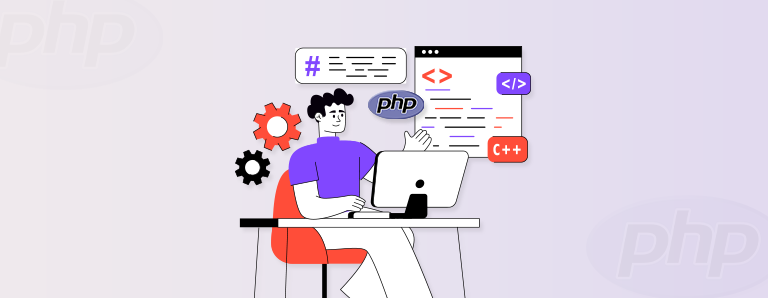Table of Contents
The financial landscape is undergoing a rapid transformation, driven by technology and the rise of Fintech. This sector demands agile, secure, and scalable solutions. Here, PHP emerges as a powerful language for building these innovative applications.
But why choose PHP? This blog dives into the world of PHP in Fintech. While exploring its benefits, tech stack, and diverse use cases employed by each top experts to conquer this thriving industry. We’ll cover the best PHP frameworks and libraries designed for financial applications.
Join us as we uncover the mysteries of PHP’s success in Fintech. While understanding its uses in payment processing, financial management tools, and fraud detection. By the end, you’ll be equipped with the knowledge and resources to undertake your own Fintech journey, leveraging the power of PHP to revolutionize the financial world.
What is Fintech?
Fintech is an acronym for “financial technology”. It signifies the fusion of innovative technology and traditional financial services. It encompasses a vast array of companies and solutions. Especially those who leverage technology to streamline and improve financial processes for both individuals and businesses.
- Payment Platforms. Mobile wallets, contactless payments, and instant money transfers replace bulky physical transactions.
- Investment Apps. Robo-advisors suggest personalized portfolios based on your goals and risk tolerance. While blockchain technology opens doors to decentralized finance (DeFi).
- Lending Platforms. Peer-to-peer lending connects borrowers and lenders. On the other hand, algorithms automate risk assessment and loan approval.
- Fraud Detection and Security. AI and machine learning algorithms analyze vast datasets. It identifies and prevents fraudulent activities, protecting consumers and businesses alike.
Fintech is not about technology. It’s about reimagining financial services to be more accessible, efficient, and secure. It helps individuals and businesses to make informed financial decisions. This industry is evolving, shaping the future of how we manage our money and interact with the financial world.
Why Use PHP in Fintech?
In the bustling landscape of Fintech, PHP stands out as a language of choice for a multitude of reasons. Its ability to combine power, versatility, and affordability makes it an ideal tool. So, why should you consider PHP for your Fintech venture?
- Rapid Prototyping. PHP’s syntax is simple. It allows us to construct prototypes and improve based on user feedback.
- Extensive Tech Stack. A rich ecosystem of frameworks like CakePHP, and Phalcon cater to specific Fintech needs. Additionally, its libraries provide pre-built functionalities for common financial tasks.
- Scalability. PHP excels at handling high-traffic applications. Its architecture scales to accommodate growing user bases and complex financial transactions.
- Security. PHP with its encryption libraries offers robust security audits.
- Cost-Effective. PHP boasts an open-source nature, preventing licensing fees that can burden projects.
PHP is ideal for Fintech due to its rapid prototyping, extensive frameworks, scalability, robust security, and cost-effectiveness. It enables efficient, secure, and affordable financial applications. If you’re looking to build a reliable Fintech platform, hire dedicated PHP developers to bring your vision to life with secure, scalable, and cost-effective solutions.
Which are the Best PHP Frameworks to Use in Fintech?
We’ve explored the compelling reasons behind PHP’s success in Fintech. Now, we’ll dive into the world of frameworks designed to empower developers in this demanding field. Indeed, each framework offers unique advantages.
1. CakePHP
CakePHP shines as a captivating choice for building Fintech applications. It attracts developers, emphasizing security, speed, and rapid development.
- Security Features. CakePHP incorporates built-in security measures. It includes input validation and CSRF prevention. This safeguards your Fintech application from common vulnerabilities.
- Fast Performance. Leveraging optimized code generation, CakePHP delivers exceptional performance. This speed advantage ensures a smooth user experience, even under high loads.
- Rapid Development. CakePHP fosters a rapid development methodology. With conventions and built-in components like authentication, authorization, and database access.
- Scalability. CakePHP’s architecture scales to accommodate growing user bases and transaction volumes. Its modular design allows for customization and integration with third-party libraries.
CakePHP emerges as a compelling option for building secure and user-friendly Fintech applications. Whether you’re building a payment gateway or a financial management tool, CakePHP’s strengths can drive your Fintech journey to success.
2. FuelPHP
FuelPHP stands as the second most competitive language for the security-conscious Fintech arena. This framework prioritizes security from the ground up. This makes it a trusted choice for building applications that handle sensitive financial data.
- Security Focus. FuelPHP integrates security best practices throughout its core. It includes input validation, secure password hashing, and CSRF protection.
- Performance Built to Scale. FuelPHP delivers exceptional performance through its efficient architecture. This concludes smooth performance even under heavy loads of real-time financial transactions.
- Modular Architecture. FuelPHP’s modular design allows developers to pick and choose components based on their specific needs.
- Rapid Development Tools. While known for its security focus, FuelPHP doesn’t compromise on development speed. Its built-in tools for scaffolding and asset management streamline the development process.
With FuelPHP’s performance and flexible architecture, you can build secure Fintech applications. While assuring it thrives in the demanding financial landscape.
3. Phalcon
Phalcon is known for its blazing-fast speed. It emerges as the most preferred choice for Fintech applications. Specifically where real-time processing and exceptional performance are important.
- C-Extension. Phalcon leverages a C-extension, bypassing the Zend Engine. This results in unparalleled performance compared to other PHP frameworks.
- Security. Phalcon incorporates security features like input validation, CSRF protection, and built-in encryption mechanisms.
- Scalability. Phalcon’s architecture scales to accommodate increasing transaction volumes. Its modular design allows for customization and integration with third-party libraries.
- Full-Stack Framework. Unlike many other frameworks, Phalcon offers a complete solution. It includes its own ORM, MVC, and caching components. This reduces external dependencies and streamlines development, saving you time and resources.
If speed is your top priority, Phalcon stands as a formidable contender. Coupled with a full-stack offering, it is ideal for high-traffic payment processing platforms.
Which are the Best PHP Libraries to Use in Fintech?
Beyond the robust frameworks, many PHP libraries are tailored for Fintech development. These specialized tools help to streamline processes and security in your Fintech applications.
1. Stripe PHP
Stripe PHP is an official PHP library for the Stripe API. It is the go-to tool for integrating seamless payment processing into your Fintech application. Dive into the core advantages that make it an indispensable companion:
- Streamlined Integration. Stripe PHP offers a well-documented interface. This simplifies the integration process into your existing PHP application.
- Payment Functionality. Stripe PHP supports a wide array of payment methods, including Apple Pay, Google Pay, and more. This versatility benefits in catering to diverse user preferences.
- Robust Fraud Prevention. The stripe includes fraud detection algorithms and machine learning to safeguard Fintech applications. This built-in layer of security protects business and sows trust among your users.
- Subscription Management. Stripe PHP simplifies handling subscriptions and recurring payments. Its flexible management capabilities streamline billing processes and enhance user experience.
- Extensive Payment Data Management. Stripe stores and manages payment data, complying with industry regulations and PCI DSS standards.
Choosing Stripe PHP helps you to create a secure, convenient, and feature-rich payment experience. It is an on-time solution for platforms like crowdfunding and e-commerce. This makes Stripe PHP stand as a formidable ally in your Fintech journey.
2. MoneyPHP
MoneyPHP benefits in financial calculations within your Fintech application. This library offers a set of features that handle financial data with confidence and accuracy. Let’s explore the key benefits MoneyPHP brings to the table:
- Currency Handling. MoneyPHP supports a wide range of currencies and handles conversions, rounding, and formatting.
- Syntax. MoneyPHP’s design prioritizes clarity and ease of use. Its intuitive syntax makes it simple to understand and integrate into your codebase.
- Math Operations. Beyond basic arithmetic, MoneyPHP offers advanced mathematical functions designed for financial calculations. With this, you can handle several complex tasks. It could include interest calculations, loan repayments, and risk assessments.
- Flexibility. MoneyPHP caters to diverse use cases and allows for customization. You can define custom currencies, formatting rules, and rounding strategies. While aligning them with your Fintech application’s specific requirements.
- Integration. MoneyPHP plays well with others. It integrates with popular PHP libraries and frameworks. This makes it a valuable addition to your existing development stack.
By leveraging MoneyPHP’s strengths, you can streamline financial calculations. Also, simplify complex financial operations. No matter, if you’re building a trading platform or a wealth management app, MoneyPHP helps with confidence and precision.
3. Laravel Sanctum
Laravel Sanctum is a Laravel-specific library. It stands as a guardian for your Fintech application’s API. Sanctum implements secure authentication using the OAuth 2.0 protocol. Dive into the key benefits that make it a trusted companion for protecting sensitive data and user information:
- OAuth 2.0 Implementation. Sanctum offers a secure and compliant implementation of OAuth 2.0. This protects your Fintech application’s data from unauthorized users.
- Integration With Laravel. As a Laravel-specific library, Sanctum integrates with your existing Laravel application. This ensures all security measures align with the development workflow.
- Granular Permission Control. Sanctum lets you define granular permissions for API access. You can control which resources specific users or applications can access, minimizing the risk of data breaches.
- API Token Management. Sanctum simplifies the issuance, management, and cancellation of API tokens. This flexible system allows you to control access and adapt to different use cases within the Fintech application.
Choosing Laravel Sanctum strengthens the security posture of your Fintech application’s API. With secure OAuth 2.0 authentication, you can safeguard your valuable data in the ever-evolving Fintech landscape. For customized requirements, consider partnering with experienced custom PHP development company.
What are the Use Cases of PHP in Fintech?
The Fintech landscape thrives on innovation, demanding secure, agile, and scalable solutions. In this arena, PHP emerges as a powerful language, driving the development of diverse and impactful applications.
But what are the specific use cases where PHP shines in the Fintech industry? This blog dives into popular applications. But, remember that your unique needs require specialized expertise.
1. Payment Processing Platform
Payment processing forms the core of the Fintech ecosystem. PHP excels in building secure and user friendly platforms that handle financial transactions. Let’s explore the key highlights of PHP-based payment processing platforms in Fintech:
- Payment Solutions. Integrate with popular payment processors like Stripe, PayPal, and Braintree. It offers diverse payment methods and global reach.
- Regulations. Adhere to strict industry regulations (PCI DSS, GDPR). With built-in security features and encryption protocols. This safeguards user data and financial information.
- Fraud Detection. Implement fraud detection systems powered by advanced analytics and machine learning. Thus, protects users and businesses from fraudulent activities.
- Personalized. Tailor payment experiences to specific needs, catering to eCommerce platforms and subscription services.
- Scalability. Handle high volumes of transactions with low latency. This helps in ensuring a smooth user experience even during periods of growth.
With these, you can build reliable and adaptable payment processing platforms. Remember, these are some key highlights; the possibilities are vast. Exploring its entire landscape can unlock custom solutions for your specific needs.
2. Trading and Investment Platform
Access to financial markets and helping individuals to make investment decisions are at the core of Fintech. PHP plays an important role in building trading and investment platforms. This enables users to buy, sell, and manage their investments.
- Real-Time Data Feeds. Gain real-time access to market data (stock prices, charts, news) through integrations with financial APIs.
- Order Management. Offer diverse order types (market, limit, stop-loss) and automated trading strategies. It allows users to customize their investment approach and manage risk.
- Portfolio Management Tools. Track performance, analyze assets, and rebalance portfolios with user friendly dashboards.
- Regulatory Compliance. Implement security measures like data encryption and multi-factor authentication to protect user information.
- Social Trading. Foster knowledge sharing by social features like watchlists, news feeds, and expert analysis. This helps in improving the user experience and building trust.
3. Risk Management
In the competitive world of finance, managing risk is paramount. This is where PHP benefits. It helps developers build risk management platforms that safeguard financial institutions.
- Advanced Analytics and Machine Learning. Leverage advanced analytics and machine learning algorithms. This can help you to predict loan defaults. Also, let’s you identify irregularities that might indicate fraudulent activities.
- Real-time Risk Monitoring. Track and monitor risks in real time. It benefits proactive decision-making and timely measures to prevent losses.
- Customizable Risk Scoring. Develop and implement customized risk-scoring models based on specific needs and regulations. This ensures accurate risk assessments for individuals and businesses.
- Regulatory Compliance. Adhere to financial regulations like Basel III and Dodd-Frank. Build platforms that comply with data security, privacy, and reporting requirements.
- Integrations With External Data Sources. Integrate with external data sources like credit bureaus and anti-money laundering databases. Conducting these practices will enrich risk assessments and enhance decision-making accuracy.
PHP powers Fintech by enabling secure, scalable, and customizable platforms for payment processing, trading, investment, and risk management. Its flexibility supports real-time data, regulatory compliance, and advanced analytics.
Conclusion
The financial landscape is undergoing a digital revolution. Where PHP stands as a powerful tool for building innovative Fintech solutions. Its uses range from secure payment processing platforms to data-driven risk management systems. PHP’s versatility and active community help to build applications that are secure, scalable, and user-friendly.
Throughout this blog, we’ve explored the compelling reasons behind PHP’s popularity in Fintech. While diving into the strengths of leading frameworks and libraries. Also, showcased diverse use cases where PHP shines. Whether you’re building a trading platform or a personalized wealth management tool, PHP helps to navigate the world of Fintech with spirit.
Ready to translate your vision into a reality? Reach out to us and our team of experienced PHP Fintech specialists will be there to assist.
FAQs About PHP in Fintech
Is PHP secure enough for fintech applications?
Yes, PHP can be secure for fintech applications when implemented with best practices. Choose well-maintained frameworks, utilize encryption, and leverage security libraries like Laravel Sanctum. Remember, thorough audits and security testing are crucial for mission-critical fintech applications.
How does PHP handle financial data?
PHP offers libraries like MoneyPHP for accurate currency conversions and calculations. Frameworks like Laravel offer secure storage solutions. Also, integration with encryption libraries safeguards sensitive data. Data handling practices should adhere to industry standards like PCI DSS for added security.
Is PHP scalable for fintech applications?
PHP’s architecture promotes scalability. Frameworks like Symfony enable modular development for easy upgrades. Caching mechanisms and code optimization further enhance performance. Consider load balancing and cloud architecture for handling user bases and transaction volumes.
Master PHP Web Development
Access expert guides and tips to enhance your PHP programming capabilities.





